人教版新目标八年级上册英语语法知识点
人教版八年级上册英语语法、短语和知识点总结归纳
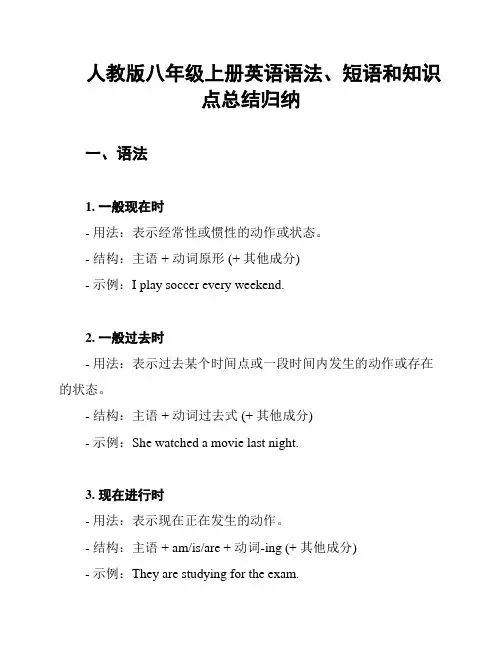
人教版八年级上册英语语法、短语和知识点总结归纳一、语法1. 一般现在时- 用法:表示经常性或惯性的动作或状态。
- 结构:主语 + 动词原形 (+ 其他成分)- 示例:I play soccer every weekend.2. 一般过去时- 用法:表示过去某个时间点或一段时间内发生的动作或存在的状态。
- 结构:主语 + 动词过去式 (+ 其他成分)- 示例:She watched a movie last night.3. 现在进行时- 用法:表示现在正在发生的动作。
- 结构:主语 + am/is/are + 动词-ing (+ 其他成分)- 示例:They are studying for the exam.4. 现在完成时- 用法:表示动作或状态发生在过去某个时间点,但与现在有关。
- 结构:主语 + have/has + 动词过去分词 (+ 其他成分)- 示例:I have finished my homework.5. 情态动词- 用法:表示能力、意愿、可能性等。
- 常见的情态动词有 can, could, may, might, must, should, ought to 等。
- 示例:He should go to bed early.二、短语1. as well as- 用法:表示两个事物同时存在或发生。
- 示例:She can speak English as well as Chinese.2. in order to- 用法:为了做某事。
- 示例:They woke up early in order to catch the train.3. by the way- 用法:用于引入一个新的话题或问题。
- 示例:By the way, have you seen the latest movie?三、知识点1. 直接引语和间接引语- 直接引语:用引号括起来的原话。
- 间接引语:将直接引语转述为陈述句或疑问句。
人教版八年级英语核心语法考点归纳
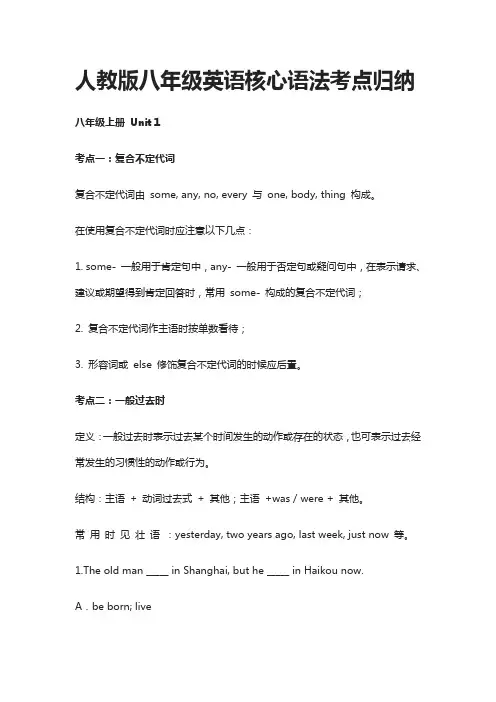
人教版八年级英语核心语法考点归纳八年级上册Unit 1考点一:复合不定代词复合不定代词由some, any, no, every 与one, body, thing 构成。
在使用复合不定代词时应注意以下几点:1. some- 一般用于肯定句中,any- 一般用于否定句或疑问句中,在表示请求、建议或期望得到肯定回答时,常用some- 构成的复合不定代词;2. 复合不定代词作主语时按单数看待;3. 形容词或else 修饰复合不定代词的时候应后置。
考点二:一般过去时定义:一般过去时表示过去某个时间发生的动作或存在的状态,也可表示过去经常发生的习惯性的动作或行为。
结构:主语+ 动词过去式+ 其他;主语+was / were + 其他。
常用时见壮语:yesterday, two years ago, last week, just now 等。
1.The old man _____ in Shanghai, but he _____ in Haikou now.A.be born; liveB.was born ; liveC.is born; livesD.was born; lives2. —Where were you last Saturday?—I ____ in the Capital Museum.A. amB. will beC. wasD. have been八年级上册Unit 2考点一:拼读副词频度副词表示动作或行为发生的频率。
常见的频度副词及其发生的频率如下表:考点二:how 疑问词组练一练3.()do you usually go to school,Simon? -by bike.A.WhenB.HowC.WhatD.Where(答案在文末获取)八年级上册Unit 3考点一:形容词和副词的比较级形容词和副词的比较能表示两者之间的比较关系,表示A 比B 更……,通常用than 来连接。
人教版新目标八年级上册-英语语法知识点
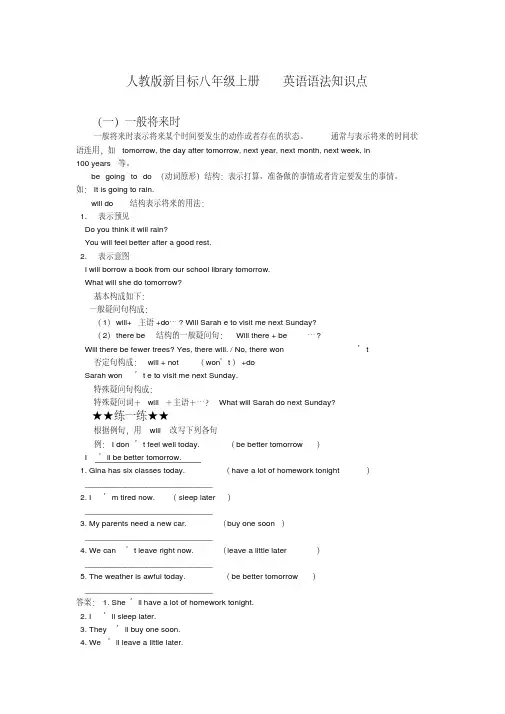
人教版新目标八年级上册英语语法知识点(一)一般将来时一般将来时表示将来某个时间要发生的动作或者存在的状态。
通常与表示将来的时间状语连用,如tomorrow, the day after tomorrow, next year, next month, next week, in100 years等。
be going to do(动词原形)结构:表示打算、准备做的事情或者肯定要发生的事情。
如:It is going to rain.will do结构表示将来的用法:1. 表示预见Do you think it will rain?You will feel better after a good rest.2. 表示意图I will borrow a book from our school library tomorrow.What will she do tomorrow?基本构成如下:一般疑问句构成:(1)will+主语+do…? Will Sarah e to visit me next Sunday?(2)there be 结构的一般疑问句:Will there + be …?Will there be fewer trees? Yes, there will. / No, there won’t 否定句构成:will + not (won’t)+doSarah won’t e to visit me next Sunday.特殊疑问句构成:特殊疑问词+will+主语+…?What will Sarah do next Sunday?★★练一练★★根据例句,用will改写下列各句例:I don’t feel well today. (be better tomorrow)I’ll be better tomorrow.1. Gina has six classes today. (have a lot of homework tonight)_____________________________2. I’m tired now. (sleep later)_____________________________3. My parents need a new car. (buy one soon)_____________________________4. We can’t leave right now. (leave a little later)_____________________________5. The weather is awful today. (be better tomorrow)_____________________________答案:1. She’ll have a lot of homework tonight.2. I’ll sleep later.3. They’ll buy one soon.4. We’ll leave a little later.5. Maybe it’ll be better tomorrow.(二)should的用法:should用来提出建议和忠告,后边加动词原形,否定句直接在should后边加not.例如:I think you should eat less junk food.我认为你应该少吃垃圾食品。
八年级英语(人教版)上册重点语法知识点
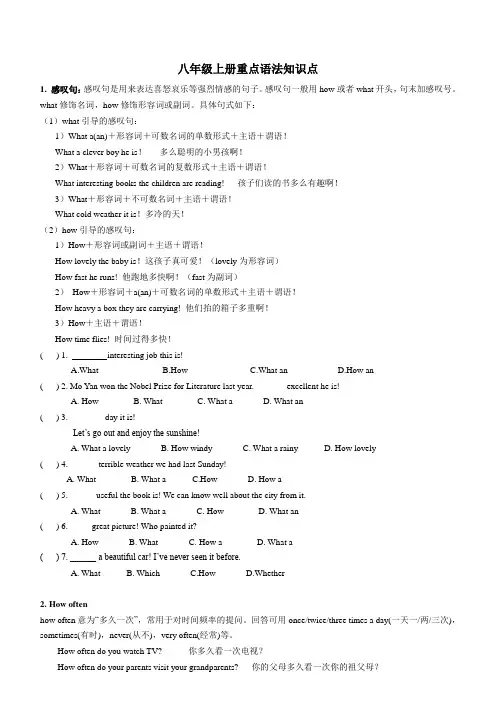
八年级上册重点语法知识点1. 感叹句:感叹句是用来表达喜怒哀乐等强烈情感的句子。
感叹句一般用how或者what开头,句末加感叹号。
what修饰名词,how修饰形容词或副词。
具体句式如下:(1)what引导的感叹句:1)What a(an)+形容词+可数名词的单数形式+主语+谓语!What a clever boy he is!多么聪明的小男孩啊!2)What+形容词+可数名词的复数形式+主语+谓语!What interesting books the children are reading! 孩子们读的书多么有趣啊!3)What+形容词+不可数名词+主语+谓语!What cold weather it is!多冷的天!(2)how引导的感叹句:1)How+形容词或副词+主语+谓语!How lovely the baby is!这孩子真可爱!(lovely为形容词)How fast he runs! 他跑地多快啊!(fast为副词)2)How+形容词+a(an)+可数名词的单数形式+主语+谓语!How heavy a box they are carrying! 他们抬的箱子多重啊!3)How+主语+谓语!How time flies! 时间过得多快!( ) 1. interesting job this is!A.WhatB.HowC.What anD.How an( ) 2. Mo Yan won the Nobel Prize for Literature last year. _______excellent he is!A. HowB. WhatC. What aD. What an( ) 3. ---______day it is!--- Let’s go out and enjoy the sunshine!A. What a lovelyB. How windyC. What a rainyD. How lovely( ) 4. ______ terrible weather we had last Sunday!A. WhatB. What aC.HowD. How a( ) 5. ______useful the book is! We can know well about the city from it.A. WhatB. What aC. HowD. What an( ) 6. _____great picture! Who painted it?A. HowB. WhatC. How aD. What a( ) 7. ______ a beautiful car! I’ve never seen it before.A. WhatB. WhichC.HowD.Whether2. How oftenhow often意为“多久一次”,常用于对时间频率的提问。
新人教新目标版八年级英语上册短语语法知识点汇总
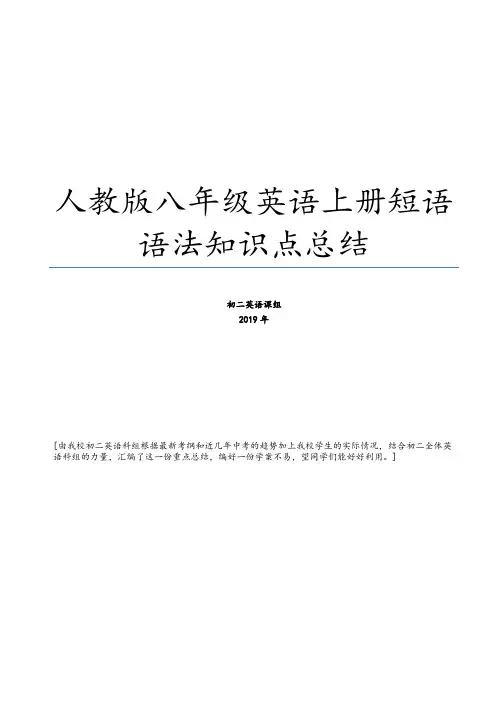
人教版八年级英语上册短语语法知识点总结初二英语课组2019年[由我校初二英语科组根据最新考纲和近几年中考的趋势加上我校学生的实际情况,结合初二全体英语科组的力量,汇编了这一份重点总结,编好一份学案不易,望同学们能好好利用。
]Unit 1 Where did you go on vacation一、必背单词短语。
Section A1.Where did you go on vacation? (P. 1)on vacation意为“在度假”,结构“on+名词”表示“在某种状态中”。
例句:My family went to Hainan on vacation last year.2....visited my uncle (P. 1)visit此处用作及物动词,后接人或物做宾语,意为“拜访、看望”,后接表示地点的名词,意为“参观、游览”。
例句:I visited my grandmother last week.例句:Do you want to visit Shanghai?3....go with anyone? (P. 2)(1)anyone用作不定代词,意为“有人、任何人”,相当于anybody,用于疑问句和否定句中,在肯定句中用someone或者somebody。
但是anyone也可以用在肯定句中,表示“任何一个人”。
例句:Did you meet anyone friendly in that city?例句:Anyone can be helpful in some way.(2)anyone只能指人,不可以指物,后面不接of短语;any one既可以指人也可以指物,后可接of短语。
例句:You can ask any one of us about this question.4....buy anything special? (P. 2)(1)buy用作双宾语动词,表示“买”,常用的结构为“buy sb. sth.”或者“buy sth. for sb.”,表示“为某人买某物”。
八年级上册英语单元语法及知识点归纳
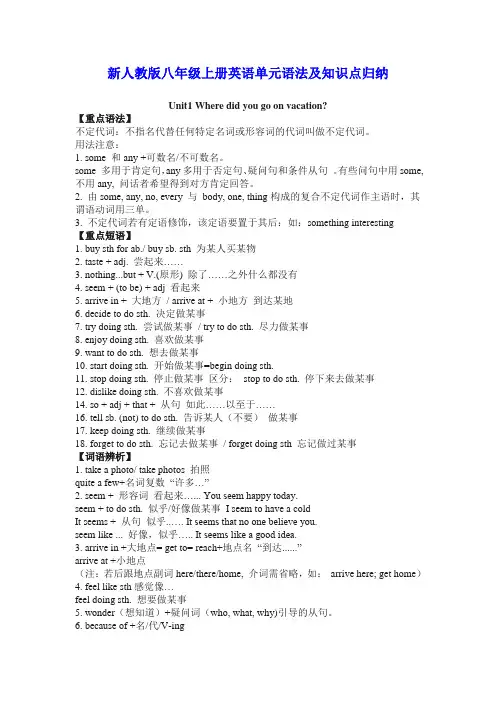
新人教版八年级上册英语单元语法及知识点归纳Unit1 Where did you go on vacation?【重点语法】不定代词:不指名代替任何特定名词或形容词的代词叫做不定代词。
用法注意:1. some 和any +可数名/不可数名。
some 多用于肯定句,any多用于否定句、疑问句和条件从句。
有些问句中用some,不用any, 问话者希望得到对方肯定回答。
2. 由some, any, no, every 与body, one, thing构成的复合不定代词作主语时,其谓语动词用三单。
3. 不定代词若有定语修饰,该定语要置于其后:如:something interesting【重点短语】1. buy sth for ab./ buy sb. sth 为某人买某物2. taste + adj. 尝起来……3. nothing...but + V.(原形) 除了……之外什么都没有4. seem + (to be) + adj 看起来5. arrive in + 大地方/ arrive at + 小地方到达某地6. decide to do sth. 决定做某事7. try doing sth. 尝试做某事/ try to do sth. 尽力做某事8. enjoy doing sth. 喜欢做某事9. want to do sth. 想去做某事10. start doing sth. 开始做某事=begin doing sth.11. stop doing sth. 停止做某事区分:stop to do sth. 停下来去做某事12. dislike doing sth. 不喜欢做某事14. so + adj + that + 从句如此……以至于……16. tell sb. (not) to do sth. 告诉某人(不要)做某事17. keep doing sth. 继续做某事18. forget to do sth. 忘记去做某事/ forget doing sth 忘记做过某事【词语辨析】1. take a photo/ take photos 拍照quite a few+名词复数“许多…”2. seem + 形容词看起来…... You seem happy today.seem + to do sth. 似乎/好像做某事I seem to have a coldIt seems + 从句似乎..…. It seems that no one believe you.seem like ... 好像,似乎….. It seems like a good idea.3. arrive in +大地点= get to= reach+地点名“到达......”arrive at +小地点(注:若后跟地点副词here/there/home, 介词需省略,如:arrive here; get home)4. feel like sth 感觉像…feel doing sth. 想要做某事5. wonder(想知道)+疑问词(who, what, why)引导的从句。
(人教版新目标)八年级英语上册全册各单元知识点期末总复习讲解教学课件
3. feel like “感受到;摸起来”,后跟宾语 从句或名词。 I felt like I was a bird. 我感觉我是一只鸟。 It feels like a stone. 它摸起来像一块石头。
eg.something special; somewhere wonderful. 2.不定代词做主语时,谓语动词用第三人称单数。 eg.Is everybody here? 大家都到齐了吗?
1. get to/reach/arrive 都是“到达“的意思。
get to+sp=reach+sp = arrive at+sp(小)=arrive in+sp(大) 若他们后面要加地点副词here, there, home等,则 不需要加介词。
25、up and down上上下下 26、come up出来 27、enjoy oneself=have fun=have a good time
玩的开心
二、重要句子(语法):
1.Where did you go on vacation? 你到哪里去度假了?
I went to New York City. 我去了纽约城。
三、习惯用法、搭配
1. buy sth. for ab./ buy sb. sth. 为某人买某物 2. taste + adj. 尝起来…… 3. nothing to do but do除了……之外无事可干 4. seem + (to be) + adj 看起来 5. arrive in + 大地方 / arrive at + 小地方 到达某地 6. decide to do sth=make a decision决定做某事 7. try doing sth. 尝试做某事
人教版新目标八年级英语上册各单元知识详解
Detailed Solution for Unit 2 What’s the matter.【重要词汇】◆ matter/5mAt[/n.事情,问题,过失◆ arm/B:m/n.臂,胳膊◆ back/bAk/n.后背,背脊◆ ear/I[/n.耳朵◆ eye/aI/n.眼睛◆ foot/fJt/n.脚,足〔pl. feet/fi:t/〕◆ leg/leg/n.腿,腿部◆ neck/nek/n.脖子,颈部◆ nose/n[Jz/n.鼻子◆ stomach/5stQm[k/n.胃,胃部◆ tooth/tU:W/n.牙齿(pl. teeth/ti:W/)◆ sore/sC:,sC[/adj.疼痛的◆ stomachache/5stQm[keIk/n.胃痛,腹痛,肚子痛◆ throat/Wr[Jt/n.喉头,喉咙◆ toothache/5tU:WeIk/n.牙痛◆ fever/5fi:v[/n.发烧◆ lie/laI/v.躺,卧,平放在某处(lay, lain)◆ honey/5hQnI/n.蜂蜜◆ dentist/5dentIst/n.牙医◆ illness/5IlnIs/n.疾病,生病◆ advice/[d5vaIs/n.劝告,忠告,建议◆ thirsty/5W\:stI/adj.渴的,口渴的◆ heal/hi:l/v. 医治,治愈◆ balance/5bAl[ns/n. 平衡,平衡状态,协调◆ beef/bi:f/n. 牛肉◆ lamb/lAm/n. 小羊,羊羔,羊羔肉◆ energy/5en[dVI/n.精力,活力,能力◆ life/laIf/n. 生命,人生◆ bean/bi:n/n.豆,豆科植物◆ stray/streI/v. 远离,走失,离题◆ balanced/5bAl[nst/adj.平衡的,协调的◆ diet/5daI[t/n. 饮食,节食◆ backache/5bAkeIk/n.背痛◆ improve/Im5prU:v/v. 改善,改进,提高◆ speaking/5spi:kIN/ n. 口语◆ headache/5hedeIk/ n. 头痛◆ homestay/5h[JmsteI/ n. 待在家里◆ important//Im5pC:t[nt/adj. 重要的,重大的,严重的【重要词组】◆ have a cold患感冒◆ stressed out 紧张的,有压力的◆ bean sprout豆芽◆ get tired感觉疲惫◆ stay healthy保持健康◆ at the moment此刻,现在◆ get/ have a cold患感冒◆ see a doctor /dentist看医生/牙医◆ go to the party去参加聚会◆ make sb sick使某人不舒服(患锁病)◆ have a sore throat嗓子痛◆ have a fever发烧,发热◆ have a toothache牙痛◆ have a backache背痛◆ lie down and rest 躺下休息◆ drink lots of water 喝大量水◆ drink hot tea with honey 喝热蜂蜜茶◆ have a headache头痛◆ get tired 累了【重要词汇扩展】身体部位:head头neck颈部shoulder肩back后背leg腿thigh大腿arm手臂hand手nose 鼻子eye眼睛ear耳朵mouth嘴tooth牙齿foot脚〔注意foot的复数形式为feet,tooth的复数形式为teeth〕stomach胃throat喉咙,咽喉chest胸部pit胸口abdomen lung肺heart心脏liver 肝脏腹部waist腰backbone脊骨,脊柱hip臂部joint关节muscle肌肉nerve神经brain 脑疾病:cancer癌 influenza , flu流感 cough咳嗽sore eyes眼睛疼stuffy nose鼻子不通气 insomnia失眠医院工作人员:doctor in charge主治医生 head nurse护士长internist , physician内科医生surgeon外科医生dentist牙科医生 ear-nose-throat doctor 耳鼻喉医生医院名称:children’s hospital儿童医院 clinic 诊疗所first - aid station 急救站 ward 病房medical department 内科 surgical department 外科registration office 挂号处 out - patient department(OPD) 门诊部in - patient department 住院部 nursing department 护理部waiting room 候诊室 emergency room 急诊室operation room 手术室 laboratory 化验室blood bank 血库 pharmacy , dispensary 药房表示感觉的形容词有:tired 累的 thirsty口渴的 hungry饿的 stressed out紧张的,有压力的【重要词句详解】1. How to talk about our health①问某人哪儿不舒服:When we are not feeling well , we often go to see the doctor . The doctor will ask : What’s wrong (with you) ?What’s the matter (with you) ?What’s your trouble ?What happens to you ?Is there anything wrong with you ?都表示“你怎么了?”。
人教版新目标英语八年级上册unit3单元知识点归纳总结
人教新目标英语八年级上册Unit 3 I’m more outgoing than my sister一.重点短语:1. as…as…和……一样 as和as 中间接形容词或副词的原级否定:not as…as…或not so…as…和…不一样(这也有比较的含义,可以和含有比较级的句子进行转换)e.g. Tom is not as short as Tim.=Tim is shorter than Tom.2. win v. 赢,赢得现在分词:winning 过去式:won 名词. winner3. talented adj. 有才能的,有才干的近义词:giftedbe talented in 在…方面有天赋,后接名词或doing。
n. talent 天赋 have a talent for 有…才能,天赋4. truly 副词. 真正,确实;由衷地,真诚地 true 形容词. 真实的 truth 名词.真相5. care about 关心,在意 care for 喜欢,愿意,照顾take care 小心,当心 take care of 照顾,照料(look after)6. make v. 做,制作,迫使 make 作使役动词时,译为“使……”,后接省略to的不定式作宾语补足语,即make sb. do sth.make +宾语+形容词(宾补) e.g. The bad news made me sad.7. laugh v. 笑,发笑 laugh at 嘲笑8. the same as…和…一样/ different from…与…不同(as和from 后接名词、代词或名词性物主代词)9. both adj. 置于被修饰的名词前adv. (1)主语后,实意动词前 (2)be 动词之后pron. both of…Both… and……和…两者都e.g. Both New York and London have traffic problems.Both she and I are good at English.10. serious adj. 严肃的,稳重的;认真的 be serious about …对……认真adv. seriously 认真地,严肃地 nothing serious 没什么严重的11. as long as (1) 用于 as…as 句型中,表示“像…一样长”(2) 表示时间,“达…之久”。
新人教版八年级上册英语单元语法及知识点概述
新人教版八年级上册英语单元语法及知识点概述本文档概述了新人教版八年级上册英语教材中各个单元的语法和知识点。
Unit 1: My New Teachers- 介绍人物时使用第三人称单数形式的动词- 询问对某人的印象时使用What do you think of...?- 表示喜欢或不喜欢某物时使用like和dislikeUnit 2: I used to be afraid of the dark- used to表示过去的惯或经历- 表示过去的状况时使用was/wereUnit 3: I feel sad- 表示情感和感受时使用feel- 使用be动词+形容词表达情感状态- 表示总是或经常做某事时使用always或often Unit 4: What's the best movie theater?- 比较级和最高级的用法- 询问建议时使用What do you suggest?- 表示原因时使用becauseUnit 5: It must belong to Carla- 表示推测或某事是肯定的时使用must- 表示推测或某事是可能的时使用might- 表示推测或某事是否定的时使用can'tUnit 6: I like music that I can dance to- 表示喜欢某种中性事物时使用like- 表示喜欢可以+动词原形的事物- 表示不喜欢不可以+动词原形的事物Unit 7: Teenagers should be allowed to choose their own clothes- 表示应该或不应该做某事时使用should or shouldn't- 表示能够或不允许做某事时使用can or can't- 使用be动词+动词不定式表示被允许或不被允许做某事Unit 8: Home alone- 表示需要或必需做某事时使用have to- 表示过去需要或必需做某事时使用had to- 表示建议或推荐时使用should或had betterUnit 9: When was it invented?- 使用一般过去时表示过去的经历或事件- 使用一般过去时的疑问句形式提问过去的经历或事件- 使用介词短语表示一段时间以上是新人教版八年级上册英语教材中各单元的语法和知识点概述。
- 1、下载文档前请自行甄别文档内容的完整性,平台不提供额外的编辑、内容补充、找答案等附加服务。
- 2、"仅部分预览"的文档,不可在线预览部分如存在完整性等问题,可反馈申请退款(可完整预览的文档不适用该条件!)。
- 3、如文档侵犯您的权益,请联系客服反馈,我们会尽快为您处理(人工客服工作时间:9:00-18:30)。
人教版新目标八年级上册英语语法知识点This manuscript was revised by the office on December 10, 2020.人教版新目标八年级上册英语语法知识点(一)一般将来时一般将来时表示将来某个时间要发生的动作或者存在的状态。
通常与表示将来的时间状语连用,如tomorrow, the day after tomorrow, next year, next month, next week, in 100 years等。
be going to do(动词原形)结构:表示打算、准备做的事情或者肯定要发生的事情。
如:It is going to rain.will do结构表示将来的用法:1. 表示预见Do you think it will rainYou will feel better after a good rest.2. 表示意图I will borrow a book from our school library tomorrow.What will she do tomorrow基本构成如下:一般疑问句构成:(1)will+主语+do… Will Sarah come to visit me next Sunday(2)there be 结构的一般疑问句:Will there + be …Will there be fewer trees Yes, there will. / No, there won’t 否定句构成:will + not (won’t)+doSarah won’t come to visit me next Sunday.特殊疑问句构成:特殊疑问词+will+主语+…What will Sarah do next Sunday★★练一练★★根据例句,用will改写下列各句例:I don’t feel well today. (be better tomorrow)I’ll be better tomorrow.1. Gina has six classes today. (have a lot of homework tonight) _____________________________2. I’m tired now. (sleep later)_____________________________3. My parents need a new car. (buy one soon)_____________________________4. We can’t leave right now. (leave a little later)_____________________________5. The weather is awful today. (be better tomorrow)_____________________________答案:1. She’ll have a lot of homework tonight.2. I’ll sleep later.3. They’ll buy one soon.4. We’ll leave a little later.5. Maybe it’ll be better tomorrow.(二)should的用法:should用来提出建议和忠告,后边加动词原形,否定句直接在should后边加not.例如:I think you should eat less junk food.我认为你应该少吃垃圾食品。
She drives a lot and she seldom walks. So I think she should walk a lot.她经常开车,很少走路。
所以我认为她应该多走路。
Students shouldn’t spend too much time playing computer games.学生们不应当花太多的时间玩计算机游戏。
学习向别人提建议的几种句式:(1)I think you should…(2)Well, you could…(3)Maybe you should …(4)Why don’t you…(5)What about doing sth.(6)You’d better do sth.★★练一练★★用should或shouldn’t填空1. I can’t sleep the night before exams.You ______ take a warm shower before you go to bed.2. Good friends ______ argue each other.3. There is little milk in the glass. We _______ buy some.4. They didn’t invite you Maybe you ______ be friendlier.5. I am a little bit overweight. So I think I _______ do exercises every day.答案:1. should 2. shouldn’t 3. should 4. should 5. should(三)过去进行时过去进行时表示过去某一点时间正在进行的动作或者过去某一段时间内一直进行的动作。
1. 构成was /were + doing,例如:I was watching TV at 9 o’clock last night.at 9 o’clock last night是时间点They were playing football all afternoon.all afternoon是时间段2. 过去进行时的标志词at 8 o’clock last night, this time yesterday等。
例如:I was having lunch at home this time yesterday.昨天的这个时候我正在吃午饭。
At that time she was writing a book.那阵子她在写一本书。
(表示她在那段时间里一直在做那件事情。
)★★练一练★★用括号中所给动词的适当形式填空。
1. This time yesterday I ____ ______(read)books.2. At 9 o’clock last Sunday they ______ ______(have)a party.3. When I _____(come)into the classroom, she ________ ______(read)a storybook.4. She _____ ______(play)computer games while her mother ____ ______(cook)yesterday afternoon.5. I _____ ______(have)a shower when you _______(call)me yesterday.答案:1. was reading 2. were having 3. came; was reading4. was playing; was cooking5. was having; called(四)间接引语形成步骤:(1)不要逗号,冒号,引号(2)要考虑到人称的变化(人称的变化与汉语是一致的)(3)要考虑时态的变化(4)要考虑时间状语、地点状语和语示代词的变化。
★★练一练★★用括号中所给动词的适当形式填空。
1. She said I _____(be)hard-working.2. Peter told me he _____(be)bored yesterday.3. She said she _____(go)swimming last Sunday.4. Bobby said he _____(may)call me later.5. Antonio told me he _____(read)a book then.答案:1. was 2. was 3. went 4. might5. was reading请转述他人说的话:1. I go to the beach every Saturday. (Tom)2. I can speak three languages. (Lucy)3. I will call you tomorrow. (Mike)4. I’m having a surprise party for Lana. (she)(五)if引导的条件状语从句结构:if+一般现在时,主语+将来时含义:如果……,将要……例如:If you ask him, he will help you.如果你请求他,他会帮助你。
If need be, we’ll work all night.如果需要,我们就干个通宵。
★★练一练★★根据中文提示,完成句子。
1. 如果你参加聚会,你将会过得很开心。
If you ________ the party, you __________.2. 如果明天下雨,我们将不去野餐。
If it __________ tomorrow, we ___________.3. 如果你经常听英文歌,你将会喜欢英语的。
If you often ________, you _________________.答案:1. If you go to the party, you will have a good time2. If it rains tomorrow, we won’t go to the picnic3. If you often listen to English songs, you’ll like English二. 完形填空特点及解题思路(一)题型分类与特点完形填空试题是在给出的一篇短文中有目的地拿掉若干个词,留下一些空格,要求考生借助短文保留的部分,从所给的短文整体出发,在正确理解短文意思的基础上,根据句子和句子间的内在联系、词的用法和习惯搭配等,用适当的词或词语填空,使补全后的短文意思通顺、前后连贯、结构完整。
这种题型测试的内容从形式上看是单词或短语的填空,但它必须注意到短文中上、下文意思连贯、词语搭配和语法结构正确,所以在空格上所填的词必须符合语义适用和语法正确两条原则,只考虑某一侧面都可能导致错误。
中考中完形填空试题的基本题型分两类:完形填空选择题和完形填空题。
